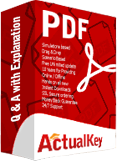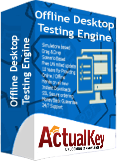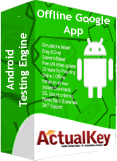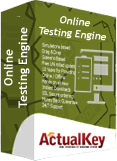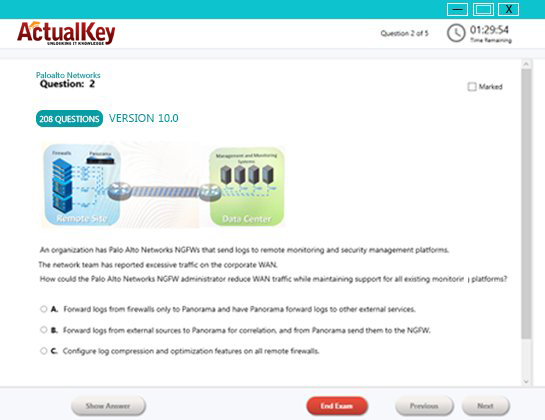Limited Time 30% Discount Offer Use Code - off30
Actualkey Prepration Latest 70-660 : TS: Windows Internals Questions and Answers PDF's, Verified Answers via Experts - Pass Your Exam For Sure and instant Downloads - "Money Back Guarantee".
| Vendor | Microsoft |
| Certification | MCTS |
| Exam Code | 70-660 |
| Title | TS: Windows Internals |
| No Of Questions | 85 |
| Last Updated | September 16,2024 |
| Product Type | Q & A with Explanation |
| Bundel Pack Included | PDF + Offline / Andriod Testing Engine and Simulator |
70-660
TS: Windows Internals
About this Exam
This exam validates deep technical skills in the area of Windows Internals. Including troubleshooting operating systems that are not performing as expected or applications that are not working correctly, identifying code defects, and developing and debugging applications that run unmanaged code or that are tightly integrated with the operating system, such as Microsoft SQL Server, third party applications, antivirus software, and device drivers.
Audience Profile
Candidates for this exam are engineers, developers, or IT staff who work with Windows at a level that requires Windows Internals knowledge. Candidates for this exam are typically in the upper echelon of the technical staff at their companies. These individuals typically hold such positions as escalation engineer, technical lead, and software design engineer. Their level of knowledge spans products both inside and outside the Microsoft Corporation. These individuals are involved in resolving problems that require deep understanding of Windows Internals rather than problems about planning and infrastructure development or how to use or configure a product that runs on Windows.
Credit Toward Certification
When you pass Exam 70-660: TS: Windows Internals, you complete the requirements for the following certification(s):Microsoft Certified Technology Specialist (MCTS): Windows Internals
Skills Being Measured
This exam measures your ability to accomplish the technical tasks listed below.The percentages indicate the relative weight of each major topic area on the exam.
Identifying Architectural Components (16%)
* Identify memory types and mechanisms.
o This objective may include but is not limited to: nonpaged vs. paged; memory descriptor lists; physical memory vs. logical memory; address translation; heap memory.
* Identify I/O mechanisms.
o This objective may include but is not limited to: Plug and play; IRQL levels; I/O request packets (IRPs); I/O manager; device stacks; filter drivers; timers
* Identify subsystems.
o This objective may include but is not limited to: Object manager; cache manager; process manager; memory manager; security reference monitor
* Identify processor functions and architecture.
o This objective may include but is not limited to: Interrupts; processor affinity; system service calls; 64-bit vs. 32-bit
* Identify process and threads.
o This objective may include but is not limited to: Process environment block (PEB), thread environment block (TEB); thread scheduling, states and priority
Designing Solutions (15%)
* Optimize a system for its drivers.
o This objective may include but is not limited to: driver signing; identifying filter drivers; timers and deferred procedure calls (DPCs); system worker threads; Driver Verifier
* Design applications.
o This objective may include but is not limited to: Application Verifier; gflags; kernel mode vs. user mode threads; structured exception handling (SEH); memory mapped files; authentication mechanisms; synchronization primitives
* Deploy compatible applications.
o This objective may include but is not limited to: Application Verifier; Application Compatibility Toolkit (ACT); gflags
* Identify optimal I/O models for applications.
o This objective may include but is not limited to: synchronous vs. asynchronous I/O; I/O completion ports; multithreaded applications
Monitoring Windows (14%)
* Monitor I/O latency.
o This objective may include but is not limited to: Perfmon; disk I/O; application performance; device I/O
* Monitor I/O throughput.
o This objective may include but is not limited to: filter drivers; cache manager; xperf; kernrate
* Monitor memory usage.
o This objective may include but is not limited to: nonpaged vs paged pool; user memory vs. kernel memory; debugging memory leaks; memory corruption; heap corruption
* Monitor CPU utilization.
o This objective may include but is not limited to: thread time; kernel vs. user time; thread states; Perfmon; WinDbg; Xperf; Kernrate
* Monitor handled and unhandled exceptions.
o This objective may include but is not limited to: Adplus; Dr Watson; Windows Error Reporting (WER); default post-mortem debuggers; exception handling
Analyzing User Mode (18%)
* Analyze heap leaks.
o This objective may include but is not limited to: UMDH (User-mode dump heap); user mode stack tracing; WinDbg; Application Verifier; Gflags; Perfmon
* Analyze heap corruption.
o This objective may include but is not limited to: Page heap; WinDbg; Application Verifier; Gflags
* Handle leaks.
o This objective may include but is not limited to: Procmon (Process Monitor); Perfmon; WinDbg; htrace; Process Explorer; Handle.exe
* Resolve image load issues.
o This objective may include but is not limited to: Tlist; loader snaps; dll dependencies; application manifests; 64-bit applications vs. 32-bit applications; tasklist
* Analyze services and host processes.
o This objective may include but is not limited to: sc.exe; services; service dependencies; service isolation; services startup types; service registry entries
* Analyze cross-process application calls.
o This objective may include but is not limited to: RPC; LPC; shared memory; named pipes; process startup; winsock
* Analyze the modification of executables at runtime.
o This objective may include but is not limited to: WinDbg; image corruption; detours; hot patches
* Analyze GUI performance issues.
o This objective may include but is not limited to: spy++; message queues; Application Verifier; TraceTools; ATL Trace; Task Manager
Analyzing Kernel Mode (19%)
* Find and identify objects in object manager namespaces and identify the objects’ attributes.
o This objective may include but is not limited to: Winobj.exe; symbolic links; object namespace; security descriptors; global namespace; device objects; file objects; object manager; semaphores
* Analyze Plug and Play (PnP) device failure.
o This objective may include but is not limited to: removal failures; global device list; WinDbg; device adds and removes; power handling
* Analyze pool corruption.
o This objective may include but is not limited to: Driver Verifier; WinDbg; pool tags; Poolmon; guard pages
* Analyze pool leaks.
o This objective may include but is not limited to: WinDbg; poolmon; Driver Verifier; crash dump analysis; paged and nonpaged pool; cache trimming
* Isolate the root cause of S state failure.
o This objective may include but is not limited to: System power states and transitions; power IRP handling
* Analyze kernel mode CPU utilization.
o This objective may include but is not limited to: kernrate.exe; WinDbg; deadlocks; Performance monitoring; event tracing
Debugging Windows (18%)
* Debug memory.
o This objective may include but is not limited to: Heap; pool; virtual memory vs. physical memory; stack; analyzing crash dumps and user dumps
* Identify a pending I/O.
o This objective may include but is not limited to: WinDbg; deadlocks; I/O manager; IRP processing
* Identify a blocking thread.
o This objective may include but is not limited to: thread state; locks; synchronization objects
* Identify a runaway thread.
o This objective may include but is not limited to: thread priorities; processor affinity; Perfmon; kernrate
* Debug kernel crash dumps.
o This objective may include but is not limited to: WinDbg; DPCs; Assembler; forcing kernel crash dumps; trap processing; register usage; call stack composition (prolog/epilog); processes vs. threads
* Debug user crash dumps.
o This objective may include but is not limited to: dump types; forcing user crash dumps; gflags; system resource utilization (CPU, disk, network; memory)
* Set up the debugger.
o This objective may include but is not limited to: WinDbg; physical connection (USB, rs-232, 1394); boot.ini; bcdedit; remoting; NMI; debugging system processes
I Got My Success Due To Actualkey 70-660 Bundle Pack Actualkey experts I got passed in the 70-660 exam without any worries at all, these exam material products gave me the reason to relax.
Budi Saptarmat
Yahoo! Got Successfully Through The 70-660 Exam Passing Exam is not a easy thanks to Acutalkey.com for providing me actual 70-660 TS: Windows Internals training with there included the Offline and Android simulators helps me success
Melinda
70-660 Exam Best Preparation I have been preparing for 70-660 TS: Windows Internals, I was not sure that I'll be able to pass because of the fact that I am not a good student however;Actualkey.com provided me best and simple exam training pdf's and I passed. I now recommend everyone
Antonio Moreno
Actualkey.com 70-660 Offline Simulator is Best My choice to select Actualkey.com and go for the preparation 70-660 TS: Windows Internals, because I got the short way with the easy way
Liliane Meichner
Actualkey.com 70-660 Exam PDF"s passed with in a week 70-660 exam pdf's that's amazing
James Wilson
Microsoft - RELATED EXAMS
Designing a Database Server Infrastructure by Using Microsoft SQL Server 2005
Questions: 92 Questions | September 16, 2024
Optimizing and Maintaining a Database Administration Solution by Using SQL Server 2005
Questions: 215 | September 16, 2024
UPGRADE: MCDBA Skills to MCITP Database Administrator by Using Microsoft SQL Server 2005
Questions: 186 Questions | September 16, 2024
Microsoft .NET Framework 2.0 - Windows-Based Client Development
Questions: 245 Questions | September 16, 2024
Microsoft .NET Framework 2.0 - Distributed Application Development
Questions: 144 | September 16, 2024
Microsoft .NET Framework 2.0-Application Development Foundation
Questions: 456 | September 16, 2024
Designing and Developing Web-Based Applications by Using the Microsoft .NET Framework
Questions: 74 | September 16, 2024
Designing and Developing Windows-Based Applications by Using the Microsoft .NET Framework
Questions: 72 Questions | September 16, 2024
Designing and Developing Enterprise Applications by Using the Microsoft .NET Framework
Questions: 86 | September 16, 2024
UPGRADE: MCAD Skills to MCPD Web Developer by Using the Microsoft .NET Framework
Questions: 584 | September 16, 2024
UPGRADE: MCAD Skills to MCPD Windows Developer by Using the Microsoft .NET Framework
Questions: 559 | September 16, 2024
UPGRADE: MCSD Microsoft .NET Skills to MCPD Enterprise Application Developer: Part 1
Questions: 609 | September 16, 2024
UPGRADE: MCSD Microsoft .NET Skills to MCPD Enterprise Application Developer: Part 2
Questions: 168 | September 16, 2024
TS: Deploying and Maintaining Windows Vista Client and 2007 Microsoft Office System Desktops
Questions: 92 | September 16, 2024
Windows Server 2008 Applications Infrastructure, Configuring
Questions: 494 | September 16, 2024
TS: Upgrading from Windows Server 2003 MCSA to, Windows Server 2008, Technology Specializations
Questions: 576 | September 16, 2024
Designing a Microsoft Office Enterprise Project Management (EPM) Solution
Questions: 50 Questions | September 16, 2024
Customizing Portal Solutions with Microsoft SharePoint Products and Technologies
Questions: 75 | September 16, 2024
Deploying Business Desktops with Microsoft Windows Server 2003 and Microsoft Office 2003
Questions: 53 | September 16, 2024
Implementing and Administering Security in a Microsoft Windows Server 2003 Network
Questions: 288 | September 16, 2024
Designing, Deploying, and Managing a Network Solution for a Small- and Medium-Sized Business
Questions: 204 | September 16, 2024
Supporting Users and Troubleshooting a Microsoft Windows XP Operating System
Questions: 114 | September 16, 2024
TS: Microsoft SQL Server 2008, Business Intelligence Development and Maintenance
Questions: 399 | September 16, 2024
PRO: Designing, Optimizing and Maintaining a Database Administrative Solution Using Microsoft SQL Server 2008
Questions: 189 | September 16, 2024
Developing E-Business Solutions Using Microsoft BizTalk Server 2004
Questions: 40 | September 16, 2024
Developing Microsoft Office Solutions Using XML with Office Professional Edition 2003
Questions: 50 | September 16, 2024
Planning and Building a Messaging and Collaboration Environment Using Microsoft Office System and Microsoft Windows Server 2003
Questions: 61 | September 16, 2024
TS: Microsoft .NET Framework 3.5, ADO.NET Application Development
Questions: 287 | September 16, 2024
TS: Microsoft .NET Framework 3.5, ASP.NET Application Development
Questions: 364 | September 16, 2024
TS: Microsoft Office Project Server 2007, Managing Projects
Questions: 145 | September 16, 2024
TS: Microsoft .NET Framework 3.5, Windows Forms Application Development
Questions: 48 | September 16, 2024
Upgrade: Transition Your MCITP SQL Server 2005 DBA to MCITP SQL Server 2008
Questions: 98 | September 16, 2024
Pro: Designing and Deploying Messaging Solutions with Microsoft Exchange Server 2010
Questions: 379 | July 1, 2024
Pro: Designing and Developing ASP.NET Applications Using the Microsoft .NET Framework 3.5
Questions: 281 | September 16, 2024
TS: Microsoft SQL Server 2008, Implementation and Maintenance
Questions: 328 | September 16, 2024
Microsoft System Center Configuration Manager 2007,Configuring
Questions: 184 | September 16, 2024
PRO: Designing and Developing Microsoft SharePoint 2010 Applications
Questions: 200 | September 16, 2024
Upgrading to Windows 7 MCITP Enterprise Desktop Support Technician
Questions: 50 | September 16, 2024
TS: Windows Applications Development with Microsoft .NET Framework 4
Questions: 278 | September 16, 2024
TS: Windows Communication Foundation Development with Microsoft .NET Framework 4
Questions: 473 | September 16, 2024
TS: Web Applications Development with Microsoft .NET Framework 4
Questions: 405 | September 16, 2024
Pro: Designing and Developing Web Applications Using Microsoft .NET Framework 4
Questions: 288 | September 16, 2024
TS: Developing Business Process and Integration Solutions by Using Microsoft BizTalk Server 2010
Questions: 100 | September 16, 2024
Designing and Providing Microsoft Volume Licensing Solutions to Small and Medium Organizations
Questions: 232 | September 16, 2024
TS: Forefront Protection for Endpoints and Applications, Configuring
Questions: 105 | September 16, 2024
Upgrade: Transition Your MCITP SQL Server 2005 DBD to MCITP SQL Server 2008 DBD
Questions: 154 | July 1, 2024
Pro: Windows Server 2008 R2, Virtualization Administrator
Questions: 176 | September 16, 2024
PRO: Designing Database Solutions and Data Access Using Microsoft SQL Server 2008
Questions: 183 | July 1, 2024
Managing and Maintaining a Microsoft Windows Server 2003 Environment
Questions: 450 | July 1, 2024
Implementing Data Models and Reports with Microsoft SQL Server 2012
Questions: 330 | July 1, 2024
Implementing a Data Warehouse with Microsoft SQL Server 2012
Questions: 322 | September 16, 2024
Transition Your MCTS on SQL Server 2008 to MCSA: SQL Server 2012, Part 2
Questions: 300 | September 16, 2024
Configuring and Deploying a Private Cloud with System Center 2012
Questions: 462 | September 16, 2024
Monitoring and Operating a Private Cloud with System Center 2012
Questions: 457 | September 16, 2024
Administering and Deploying System Center 2012 Configuration Manager
Questions: 208 | September 16, 2024
Microsoft Dynamics AX 2012 Process Manufacturing Production and Logistics
Questions: 149 | July 1, 2024
Advanced Metro style App Development using HTML5 and JavaScript
Questions: 225 | September 16, 2024
Transition Your MCTS on SQL Server 2008 to MCSA: SQL Server 2012, Part 1
Questions: 230 | September 16, 2024
Transition Your MCITP: Database Administrator 2008 or MCITP: Database Developer 2008 to MCSE: Data Platform
Questions: 261 | September 16, 2024
Transition Your MCITP: Business Intelligence Developer 2008 to MCSE: Business Intelligence
Questions: 132 | September 16, 2024
Designing Database Solutions for Microsoft SQL Server 2012
Questions: 231 | September 16, 2024
Designing Business Intelligence Solutions with Microsoft SQL Server 2012 Exam
Questions: 314 | September 16, 2024
Microsoft Programming in HTML5 with JavaScript and CSS3 Exam
Questions: 342 | September 16, 2024
Delivering Continuous Value with Visual Studio 2012 Application Lifecycle Management
Questions: 219 | July 1, 2024
Enterprise Voice & Online Services with Microsoft Lync Server 2013
Questions: 158 | September 16, 2024
Developing Microsoft SharePoint Server 2013 Core Solutions
Questions: 181 | September 16, 2024
Upgrade your MCPD: Web Developer 4 to MCSD: Web Applications
Questions: 229 | September 16, 2024
Essentials of Developing Windows Metro style Apps using C#
Questions: 168 | September 16, 2024
Server Virtualization with Windows Server Hyper-V and System Center
Questions: 149 | September 16, 2024
Essentials of Developing Windows Metro style Apps using HTML5 and JavaScript
Questions: 166 | September 16, 2024
TS: Windows Small Business Server 2011 Standard, Configuring
Questions: 55 | September 16, 2024
TS: MS Internet Security & Acceleration Server 2006, Configuring
Questions: 80 | September 16, 2024
TS: Microsoft System Center Operations Manager 2007, Configuring
Questions: 94 | September 16, 2024
TS: System Center Virtual Machine Manager 2008, Configuring
Questions: 45 | September 16, 2024
PRO: Designing a Business Intelligence Infrastructure Using Microsoft SQL Server 2008
Questions: 115 | September 16, 2024
Upgrade: Transition Your MCITP SQL Server 2005 BI Developer to MCITP SQL Server 2008 BI Developer
Questions: 203 | September 16, 2024
Recertification for MCSD: Application Lifecycle Management
Questions: 292 | September 16, 2024
TS: Microsoft .NET Framework 3.5 Windows Presentation Foundation Application Development
Questions: 101 | September 16, 2024
TS: Microsoft .NET Framework 3.5 - Windows Communication Foundation
Questions: 270 | September 16, 2024
TS: Visual Studio Team Foundation Server 2010, Administration
Questions: 72 | September 16, 2024
Pro: Designing and Developing Windows Applications Using Microsoft .NET Framework 4
Questions: 239 | September 16, 2024
TS: Microsoft Windows SharePoint Services 3.0 Application Development
Questions: 109 | September 16, 2024
Upgrade: Transition your MCPD Enterprise Application Developer Skills to MCPD Enterprise Application Developer 3.5, Part 1
Questions: 153 | September 16, 2024
UPGRADE: Transition your MCPD Enterprise Application Developer Skills to MCPD Enterprise Application Developer 3.5, Part 2
Questions: 123 | September 16, 2024
TS: System Center Data Protection Manager 2007, Configuring
Questions: 74 | September 16, 2024
Designing and Providing Microsoft Volume Licensing Solutions to Large Organizations
Questions: 126 | September 16, 2024
TS: Designing, Assessing, and Optimizing Software Asset Management (SAM)
Questions: 85 | September 16, 2024
MS Office Communication Server 2007-U.C Voice Specialization
Questions: 174 | September 16, 2024
Microsoft Office Communications Server 2007 R2 U.C. Voice Specialization
Questions: 101 | September 16, 2024
Windows Server 2008 Hosted Environments, Configuring and Managing
Questions: 75 | September 16, 2024
Designing and Providing Microsoft Volume Licensing Solutions to Large Organisations
Questions: 104 | September 16, 2024
Pro: Designing and Developing Windows Applications Using the Microsoft .NET Framework 3.5
Questions: 105 | July 1, 2024
Pro: Designing and Developing Enterprise Applications Using the Microsoft .NET Framework 3.5
Questions: 152 | September 16, 2024
Universal Windows Platform – App Data, Services, and Coding Patterns (beta)
Questions: 47 | September 16, 2024
Universal Windows Platform – App Architecture and UX/UI (beta)
Questions: 76 | September 16, 2024
Microsoft Dynamics AX 2012 R3 CU8 Installation and Configuration
Questions: 48 | July 1, 2024
Designing and Deploying Microsoft Exchange Server 2016 Exam
Questions: 166 | September 16, 2024
Introduction to Programming Using Block-Based Languages (Touch Develop)
Questions: 72 | July 1, 2024
Development, Extensions and Deployment for Microsoft Dynamics 365 for Finance and Operations
Questions: 90 | July 1, 2024
Financial Management in Microsoft Dynamics 365 for Finance and Operations
Questions: 73 | July 1, 2024
Designing and Providing Microsoft Licensing Solutions to Large Organizations
Questions: 195 | July 1, 2024
Distribution and Trade in Microsoft Dynamics 365 for Finance and Operations
Questions: 93 | July 1, 2024
Administering Microsoft System Center Configuration Manager and Cloud Services Integration
Questions: 150 | July 1, 2024
Microsoft Configuring and Operating a Hybrid Cloud with Microsoft Azure Stack Exam
Questions: 99 | July 1, 2024
Microsoft Azure Solutions Architect Certification Transition Exam
Questions: 393 | July 1, 2024
Outlook 2016: Core Communication, Collaboration and Email Skills
Questions: 35 | July 1, 2024
Microsoft Developing Solutions for Microsoft Azure Exam
Questions: 170 / 6 Case Study | July 1, 2024
Designing and Implementing a Data Science Solution on Azure Exam
Questions: 442 | December 3, 2024
Microsoft 365 Teamwork Administrator Certification Transition Exam
Questions: 120 | July 1, 2024
Microsoft Messaging Administrator Certification Transition Exam
Questions: 155 | July 1, 2024
Microsoft Excel 2016: Core Data Analysis, Manipulation, and Presentation Exam
Questions: 35 | November 8, 2024
Microsoft Word 2016: Core Document Creation, Collaboration and Communication Exam
Questions: 35 | November 8, 2024
Microsoft Dynamics 365 for Finance and Operations, Supply Chain Management Exam
Questions: 394 | November 25, 2024
Microsoft Dynamics 365 for Finance and Operations, Manufacturing Exam
Questions: 207 | November 8, 2024
Building Applications and Solutions with Microsoft 365 Core Services Exam
Questions: 242 | July 1, 2024
Microsoft Dynamics 365: Finance and Operations Apps Solution Architect Exam
Questions: 295 | February 18, 2025
Planning and Administering Microsoft Azure for SAP Workloads Exam
Questions: 652 | July 1, 2024
Microsoft Dynamics 365: Finance and Operations Apps Developer Exam
Questions: 283 | February 21, 2025
Administering Relational Databases on Microsoft Azure (beta) Exam
Questions: 341 | December 13, 2024
Microsoft Dynamics 365 Business Central Functional Consultant (beta) Exam
Questions: 279 | November 8, 2024
Microsoft Power Platform Functional Consultant (beta) Exam
Questions: 289 | February 18, 2025
Configuring and Operating a Hybrid Cloud with Microsoft Azure Stack Hub Exam
Questions: 176 | July 1, 2024
Microsoft Dynamics 365 Fundamentals Customer Engagement Apps (CRM) (beta) Exam
Questions: 159 | October 12, 2024
Microsoft Dynamics 365 Fundamentals Finance and Operations Apps (ERP) Exam
Questions: 146 | February 14, 2025
Configuring and Operating Windows Virtual Desktop on Microsoft Azure Exam
Questions: 207 | February 20, 2025
Designing and Implementing a Microsoft Azure AI Solution (beta) Exam
Questions: 321 | December 2, 2024
Designing and Implementing Microsoft Azure Networking Solutions Exam
Questions: 281 | January 22, 2025
Designing Microsoft Azure Infrastructure Solutions (beta) Exam
Questions: 324 | January 16, 2025
Designing and Implementing Cloud-Native Applications Using Microsoft Azure Cosmos DB (beta) Exam
Questions: 140 | January 28, 2025
Configuring Windows Server Hybrid Advanced Services (beta) Exam
Questions: 157 | October 22, 2024
Administering Windows Server Hybrid Core Infrastructure (beta) Exam
Questions: 334 | September 2, 2024
Microsoft Designing and Implementing Enterprise-Scale Analytics Solutions Using Microsoft Azure and Microsoft Power BI Exam
Questions: 160 | July 1, 2024
Microsoft Dynamics 365 Supply Chain Management Functional Consultant Expert Exam
Questions: 152 | August 20, 2024
Implementing Analytics Solutions Using Microsoft Fabric Exam
Questions: 117 | February 21, 2025
Implementing Data Engineering Solutions Using Microsoft Fabric Exam
Questions: 67 | January 9, 2025
Exams code, certifications, vendor or keywords
![]()
Copyright © 2009 - 2025 Actualkey. All rights reserved.

